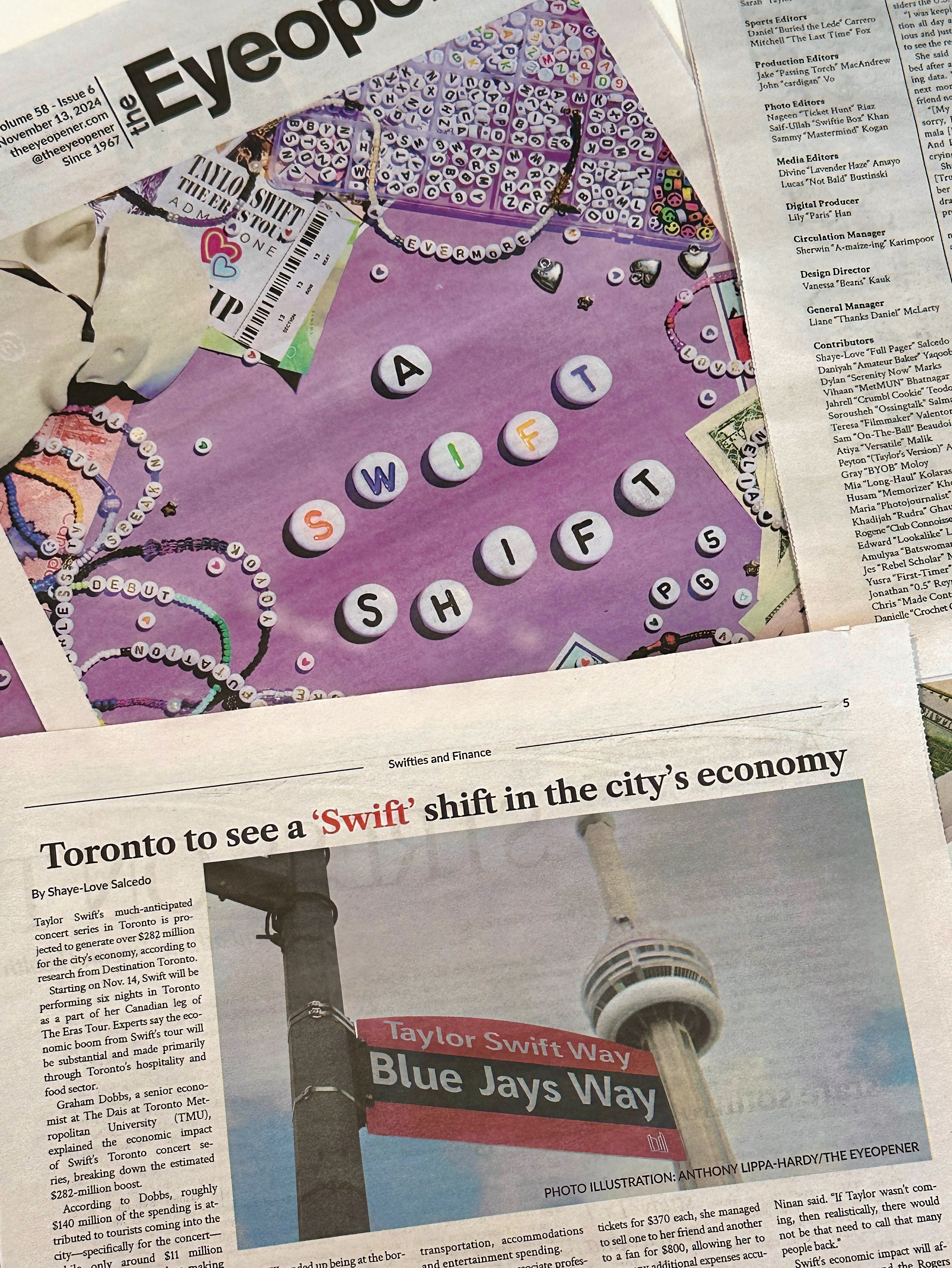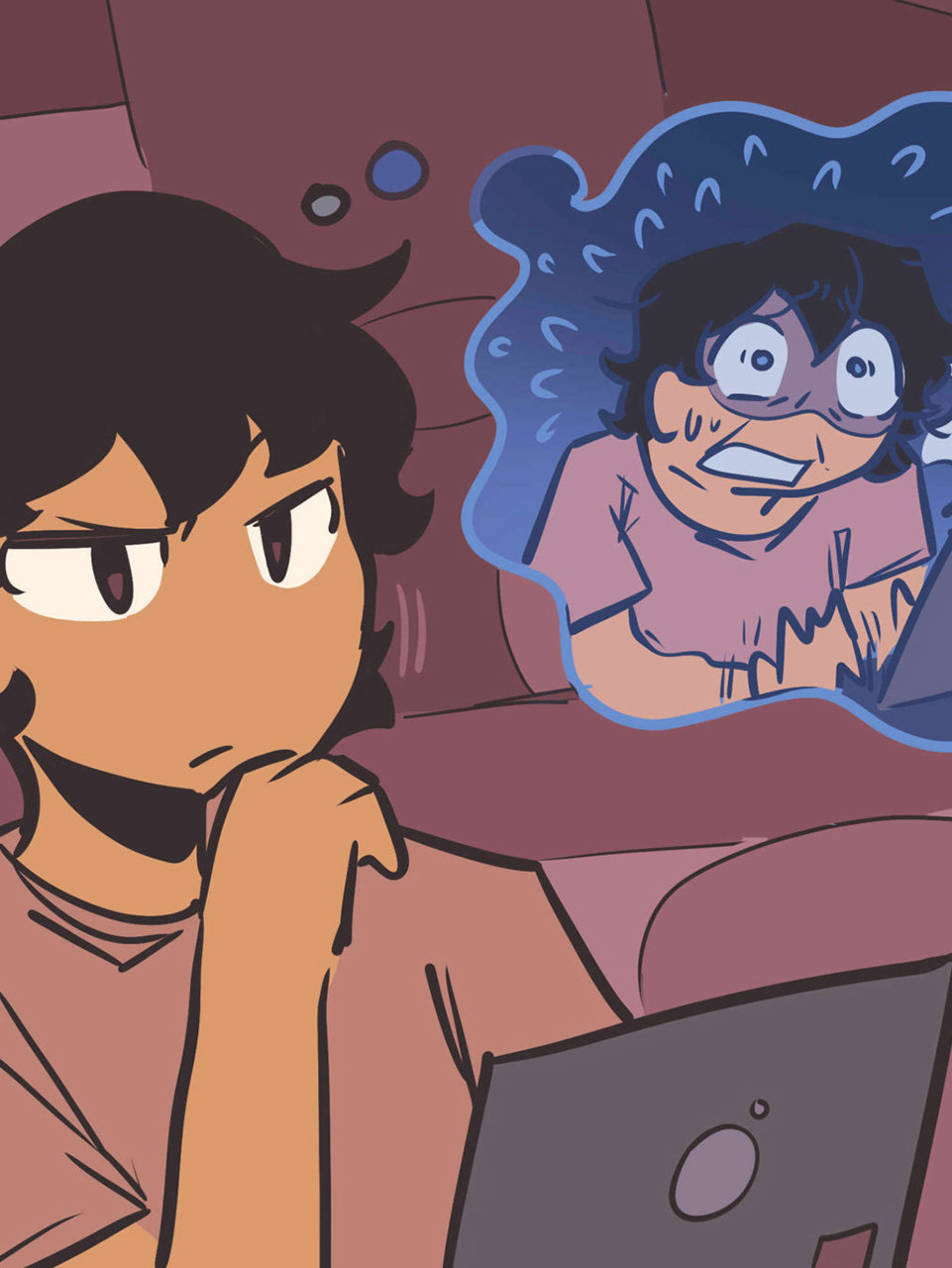Full document here.
From Studio to Street: The Rise of Toronto's Local Makers
Along Queen Street West, the Good Friends Market buzzed with life, nestled inside the Sid Lee office building and just a block away from the leafy sanctuary of Trinity Bellwoods Park. The late-summer sun filtered through towering windows, casting a honeyed glow across the space. The air was alive with the scent of lavender sachets mingling with the sweetness of freshly baked mochi matcha cookies—vendors, radiant with enthusiasm, handed purchases over to shoppers with warm smiles and heartfelt thanks.
Each booth was a curated treasure trove. Racks displayed vintage clothing from ‘80s denim jackets to ‘90s floral blouses, each piece evoking the unique character of its era. Nearby, stacks of handcrafted ceramic mugs and bowls were painted in muted greens and soft blues, their organic shapes adding a rustic charm.
Handmade jewelry glistened under the sunlight: intricate gold rings, beaded necklaces in vibrant hues, and delicate pearl earrings, all elegantly arranged on velvet trays. Small trinkets—enamel pins adorned in whimsical designs, intricately carved wooden keepsakes and pressed-flower bookmarks—beckoned visitors to pause and linger.
I wandered through every aisle, stopping at a colourful booth with a white table banner that read Cotton Fleury Crochet. The vendor was carefully arranging her vases of crochet flowers, each uniquely crafted—from tulips to camellias. She smiled warmly as I picked up a sunflower, its soft, textured petals inviting to the touch. Searching for a birthday gift for a friend, I asked whether she offered in-person pickup or just mail orders.
She explained how flexible her shipping was: “You can select the pickup option on my website,” she said. “My products are also available at Accent and Co. at The Well,” noting that her apartment, just two minutes away, served as a quick pickup spot for local customers. Her business card also felt like a direct link to her artistry—small yet purposeful, a fitting symbol of the personal touch she brings to every piece.
The most captivating booth was the live poetry station. Behind a vintage typewriter, the poet sat with fingers poised, waiting as each customer shared their chosen topic. The typewriter's rhythmic clack punctuated the market's hum as he transformed their thoughts into carefully crafted verses. I watched as two girls leaned in, their curiosity growing with each line he read aloud. Their expressions shifted—thoughtful, then tender—until tears glimmered in their eyes. They clutched the poem, now neatly tucked into a simple envelope as if holding something fragile yet profound. In that moment, I saw how creativity, distilled to its purest form, could transcend words and forge an intimate connection.
Small businesses thrive on community commerce, where vendors sell their products and share the stories behind their creative journeys. Many launched their ventures out of passion or during the pandemic, leveraging digital platforms to showcase their work and connect with customers. Between March 2020 and June 2023, an average of 15,583 new businesses entered the economy each month, highlighting a surge in entrepreneurial activity. The artisan goods and craft industry becomes a place where the value of craft and connection is tested against the convenience of the digital age.
In Toronto’s dynamic entrepreneurial scene, small businesses create opportunities for direct community engagement, carving out space amid rapid urban development and the rise of e-commerce. With each pop-up market or boutique storefront, local artisans bring the warmth of hands-on craftsmanship and face-to-face interaction to a bustling city. As Toronto evolves, these businesses meet the demand for unique, tangible products that foster a sense of connection and authenticity.
According to Clearly Payments, 15 per cent (1.29 million) of all small businesses in Canada are based in Toronto as of 2024. Amid increasing digital fatigue, Toronto's artisan businesses thrive by offering more than just products—they provide a story and a personal connection between maker and consumer. In an era dominated by mass production, these artisans become storytellers, creating relationships and experiences that corporate giants and digital commerce struggle to replicate.
The Value of Craftsmanship in a Digital World
On a Tuesday afternoon, the amber-hued lighting of Hanji Gifts (hanji meaning ‘Korean paper’) cast a cozy radiance over shelves filled with miniature figurines, journals, and artisanal pens. The gentle illumination created soft, inviting shadows across the polished wood surfaces, enhancing the store’s tranquil atmosphere. The faint rustling of customers flipping through cards and notebooks complemented the earthy scent of crafted Korean-patterned paper sheets draped across the back walls. Tucked into Queen Street West, Hanji Gifts is more than a stationery store—it’s a sanctuary for those seeking a tactile connection to handmade beauty.
Behind the counter, the owner, Catherine Choi, enthusiastically unboxes new Journal J planners from Iconic, a Korean stationery brand known for its sleek, minimalist designs and practical layouts. She intended to celebrate modern and traditional design, gathering the treasures she loved while living in Korea. She now owns two more storefront locations on Bloor Street and in the Beaches, with a website that ships worldwide.
Choi’s story is emblematic of a growing movement in Toronto. Like other small businesses, her success reveals how an authentic, carefully curated experience can create a powerful bond with customers and allow stationery small businesses to flourish despite digitization. She reinforces a sense of community with stationery through her customer service and complimentary gift wrapping for their items. “[We want to] focus on giving great customer service because I think that's a long-term marketing plan, [where] people will come back, and they’ll appreciate the love that we put into everything way more,” she said.
For Choi and her customers, the appeal of paper goes beyond nostalgia—it’s about intentionality. “Because everything’s going digital, people are going to want paper more because it’s going to be more special…,” Choi explained, “People were missing having tactile things and started writing letters, journaling and crafting again.” She observed this shift during the COVID-19 pandemic and worked tirelessly to keep Hanji Gifts afloat.
A study conducted in 2015 had women aged 19 to 54 handwrite, type on a keyboard or use an iPad to write words. Those who had written by hand were significantly better at recalling their words, suggesting that the pen-and-paper approach fosters a more profound link to thoughts and ideas than typing ever could. “Screens are a tool, and they serve a purpose,” Choi said, “but we also need to be out in the real world.”
Choi was forced to lay off her staff and temporarily close the storefronts following lockdown protocols, yet remained hopeful that Hanji Gifts would survive the pandemic. “I just had this feeling like I won’t sleep…” she said. “So it was worth it to kind of push myself a bit too far, but this is my baby, and I wanted it to do well.” As she fought to keep her business alive, her determination reflected small business owners who pour their hearts into their work, turning passion into purpose even amid uncertainty. Some find creative ways to thrive beyond physical spaces in today's evolving retail landscape. For many, success comes not from a shop on a bustling street but from crafting something meaningful that resonates with others.
From Art to Activism
Tangible products foster human connection and become a catalyst for activism. For Susanna Ding, the owner of Stickers By Suzie, her story reveals how a passion project can evolve into a thriving small business with creative reminders of personal expression. “I was just really into drawing,” she recalled, “so in the pandemic, I decided to revisit that…painting on tote bags, on shoes, just random stuff I thought was nice.” What began as a creative outlet quickly became something more.
When George Floyd’s death spurred the Black Lives Matter movement in May 2020, Ding wanted to contribute. “I decided to make a pack of stickers…and donate all the money to an organization.” The sticker pack featured four designs: one with a raised fist symbolizing solidarity, another showing two hands clasped with “Black Lives Matter” written on them, and two text-based designs stating “No Justice, No Peace” and “Justice For All.” To her surprise, the interest was immediate. “A lot of people were really interested,” Ding reflected, “and I thought…this might be a good idea.” Orders poured in as her small gesture of solidarity resonated deeply. Her Etsy shop began to thrive, transforming a simple art account into Stickers By Suzie.
Ding’s product line grew as she expanded her offerings—ranging from various anime and Sanrio enamel pins to her newly released bunny plush toy. “It just slowly became making stickers, then keychains…and more and more things, like totes, plushies, and enamel pins,” she said. For many customers, her creations are more than just decorative items—they serve as reminders of shared interests, fandoms, and self-expression. These items often become cherished keepsakes, reinforcing bonds between friends or capturing moments of self-expression.
In a digital age, Ding’s journey highlights the enduring desire for physical objects that carry meaning, offering comfort and connection in ways that screens cannot recreate—all born from a simple love of drawing.
The pandemic brought unprecedented challenges for small business owners, leaving many artisans and creators uncertain as their livelihoods hung in the balance. For Toronto’s artisans, the shift to a more digital world was necessary and a hurdle, threatening to erode the personal connections that made their work so meaningful. Ding’s story underscores the resilience needed to survive these shifts. Their crafts became more than products—they were lifelines offering solace. Their perseverance highlights the delicate balance between adapting to digital demands and preserving the heartfelt effort that defines their work.
According to a 2022 survey by the Greeting Card Association, eight out of 10 people agree that greeting cards cannot be replaced by social media, emphasizing the value placed on physical, unique items. The card buyers surveyed consider greeting cards “absolutely” or “almost” essential to them—emphasizing the thoughtful expressions of care and connection greeting cards have for every milestone in life.
Combatting Mass Production With Personal Touch
As Canada’s small business community grows, mass production dominates the market, often leaving consumers with generic, impersonal products. This challenges individuals seeking unique, meaningful items that reflect personal stories or connections. This shift has created opportunities for entrepreneurs like Isabel Jordan, a fourth-year Graphic Communications Management student at Toronto Metropolitan University (TMU). For Jordan, her late-night beading hobby became the foundation of her small business, Bels Beads, which specializes in handcrafted, delicate bead bracelets.
Jordan’s journey began when a friend took her to a bead shop for her birthday and made bracelets together, sparking a love for creating personalized jewelry. “I just love all arts and crafts and design,” she said. What started as a passion project soon became a thriving business, with Jordan often staying up late perfecting her designs.
Bels Beads was born to offer something personal in a world dominated by mass production. “It’s a mixture of knowing that this was crafted by somebody that makes a very big appeal,” Jordan explains. She emphasizes that her jewelry’s handmade quality and local student origins set it apart from mass-produced alternatives.
Jordan sources most of her materials locally in Toronto and sometimes even repurposes beads from thrifted jewelry. Her approach directly addresses the problem of mass production’s impersonal nature and reflects her personal ethos. Jordan provides a sustainable alternative by sourcing materials locally, repurposing beads from thrifted jewelry, and designing unique pieces.
The value of handcrafted jewelry was evident early on, as Jordan gifted her initial designs to friends. “I would never make a similar style that I had gifted somebody because that's personal,” she says, underscoring the individualized nature of her work.
Jordan’s bracelets quickly found an audience, particularly among friends and members of her running club who supported her first campus market in September. Her designs stand out from those of other jewelry vendors, who often focus on metal goods like silver and gold. “I think I’m doing enough of a distinct style,” she adds.
Her creative process is as intentional as her artistry. Jordan’s bracelets feature a delicate, dainty aesthetic, achieved by using a variety of bead types and sizes. “You need a variety of different bead sizes so that it can nicely transition from thin to thick and then thin again,” she explains. This thoughtful layering and attention to detail give her bracelets a distinct charm, distinguishing them from mass-produced alternatives. Customer feedback also plays a vital role in shaping her work, with specific colour requests guiding her sourcing choices.
Jordan’s bracelets fulfill the desire for something personal and foster deeper connections with her customers, who appreciate knowing their jewelry was crafted with care and intention.
AI vs. People
For Cynthia Yuan, the heart of her small business, Illuscyn, lies in the connections she forms with her customers. “The best part is meeting new people,” she shares. “People who buy from small businesses are pure and so supportive. You get to chat with the people buying your stuff and then make a connection.”
As someone who creates handcrafted items inspired by Studio Ghibli movies, Yuan emphasizes the sentimentality that comes with handmade goods. “Just as a small business, it just feels good to create stuff that’s organic,” she says. For her, this human touch is irreplaceable, even as technology like AI continues to revolutionize industries.
“As much as AI has taken over, everyone in the world will appreciate an item that is handmade versus something that’s machine-made,” Yuan reflects. She believes that the sentimentality of a handmade item will always be present but will also be challenging to maintain. “AI is making everything so much more convenient.”
However, she acknowledges the challenges small businesses face in an AI-driven world. “The only thing that’s different would be the price,” Yuan admits. “I’d say a lot of people don’t want to get from small business, just because it can be more expensive.” She says that if the price weren’t there, people would all prefer something genuinely handmade because of the great efforts made to create products that resonate with others.
Despite these challenges, Yuan remains optimistic about the future of artisan work. For her, Illuscyn is more than a business—it’s a way to celebrate the human touch in a rapidly digitalizing world.
Timeless Blooms
This desire for meaningful, enduring creations isn’t limited to jewelry. Mai Trinh, the owner of Cotton Fleury Crochet, offers another unique solution: handcrafted crochet flowers. Where Jordan’s bracelets charm with their delicate beads, Trinh’s flowers are timeless, heartfelt gifts. These handcrafted blooms are significant, offering lasting mementos for special occasions or simply to brighten someone’s day. Her business is committed to creating a thoughtful alternative since floral items had a 10 to 15 per cent price increase in the past year.
Trinh was inspired by a trend of crochet flowers she noticed during her visit to Vietnam and reflected on the high prices of flower bouquets in Toronto. “With crochet flowers, they don’t die, people can keep them,” she said.
Her intricate creations, from soft pastel tulips to ruffled carnations and cheerful sunflowers with golden petals, highlight her meticulous attention to detail and the care she puts into every stitch. For customers wanting a truly unique gift, Trinh’s “Build Your Own Bouquet” service allows them to select their favourite flowers, crafting a personalized arrangement that reflects their style and sentiment. “Whoever thought of buying [crochet flowers] takes time into doing research on not giving a common gift,” she adds.
For many, the value of such gifts lies in the thought and care behind them. One small business consumer, Theresa Duerr-Farell, reminisces about her experience buying a ceramic mug from Jennifer’s of Nova Scotia in her hometown, Halifax, to give to her friend. “That was really special to me, because it was also his favourite colour, and he was really excited to get it,” she said. That friend eventually became her boyfriend, and the memory of that thoughtful gift and her appreciation for other handmade items remains deeply meaningful to her.
Whether given as heartfelt tokens for special occasions or used to brighten a space, Cotton Fleury Crochet’s creations offer more than decoration—they provide lasting mementos that capture significant moments and personal connections.
Comfort in Community
For Geann Gamboa, the heart of their small business, Gemwrld, lies in their vibrant art prints and whimsical sticker sheets and in fostering a supportive community for other small creators. As an illustration student at Ontario College of Art and Design (OCAD), Gamboa has become a key figure in the pop-up market scene, co-leading OCAD Artist Alley for the Spring 2024 season and contributing to its planning team for three years prior.
In April, Gamboa’s leadership faced a significant challenge when OCAD required their team to cover the salary of custodial and security staff for the event. “It was honestly shocking,” they recall. Despite OCAD Artist Alley bringing significant foot traffic and visibility to the school, the financial burden threatened to undermine the event. Yet, Gamboa and their team persevered, advocating for the value these markets bring to the institution and the artists and community members involved.
“We’re just a bunch of students. It was kind of heartbreaking,” Gamboa explains. The experience tested their resolve, but the outpouring of support from attendees and artists made it all worthwhile. “The amount of support we got from the community was overwhelmingly positive. It made everything worth it.”
Eventually, they reached an agreement with OCAD, ensuring that the event could continue without imposing additional costs on the student organizers. “In the end, it was a welcomed challenge,” Gamboa reflects. “We came out stronger.”
Now, Gamboa channels this experience into organizing their own vendor market, the Mako Art Market. This initiative, short for “Mahal Ko” in Tagalog (my love in English), aims to spotlight emerging artists and small business owners, fostering a space where creators can thrive together. With a focus on accessibility, Gamboa ensures that vendors can table without hefty fees, prioritizing inclusivity and community building. “I just really want to make a place that's very safe and fun for not only the artists, but people who like me who buy stickers [and] buy art,” they share.
Through Gemwrld and the Mako Art Market, Gamboa exemplifies the power of small businesses not only to create personal, meaningful products but also to build vibrant, interconnected communities.
In an era where convenience often trumps connection, Toronto’s artisan markets remind us of the power of human touch. Here, the value of craftsmanship thrives, offering a refuge from the digital world and a space where stories are shared, memories are created, and communities are strengthened—one handmade piece at a time.
These markets, small businesses, and artisans are more than vendors. They are dreamers and storytellers, crafting products, connections, and memories. They show us that even in a world dominated by algorithms and mass production, there’s still magic in the human touch. And as long as there are people who seek beauty, connection, and authenticity, their work will continue to inspire.
Because in the end, the value of craft isn’t just in the object—it’s in the hands that make it and the hearts it touches.
“You’re not seeing the Etsy logo in the top left or ‘Add to Shopping Cart.’ You’re talking to a real person,” Duerr-Farell said. “It wouldn’t be the same as talking to the artist who makes what you're buying and getting to know them and the business itself more.”










